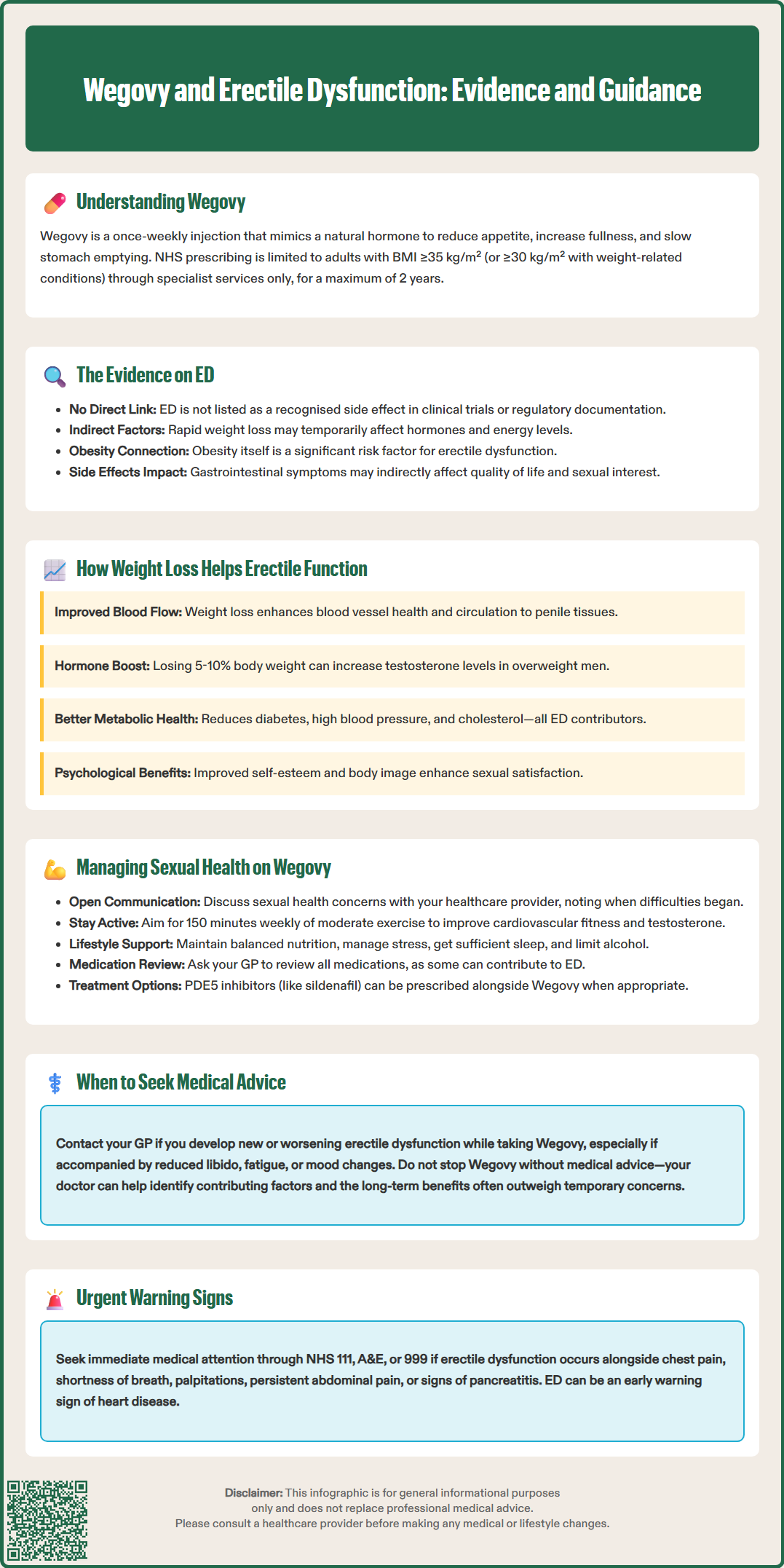
Wegovy (semaglutide 2.4 mg) is a GLP-1 receptor agonist licensed in the UK for weight management in adults with obesity or those overweight with weight-related comorbidities. Whilst concerns about Wegovy and erectile dysfunction occasionally arise, there is no established direct link between the medication and erectile difficulties in clinical literature or regulatory documentation. Understanding the complex relationship between weight loss, metabolic health, and sexual function is essential for patients considering or taking this treatment. This article examines the evidence surrounding Wegovy and erectile dysfunction, explores how weight loss may actually improve erectile function, and provides guidance on managing sexual health during treatment.
Quick Answer: Wegovy (semaglutide) is not established to cause erectile dysfunction, and weight loss achieved with this medication may actually improve erectile function in men with obesity.

Mounjaro® is the most innovative GLP-1 medication proven to dramatically curb appetite, hunger, and cravings to help professional men achieve substantial weight loss.
Start Here
Wegovy® is a weekly injectable GLP-1 medication with proven effectiveness in reducing appetite, hunger, and cravings to help busy professionals lose significant weight.
Start HereWegovy (semaglutide 2.4 mg) is a prescription medicine licensed in the UK for weight management in adults with obesity or those who are overweight with at least one weight-related comorbidity. It belongs to a class of medications called glucagon-like peptide-1 (GLP-1) receptor agonists, which work by mimicking a naturally occurring hormone that regulates appetite and food intake.
The medication is administered as a once-weekly subcutaneous injection, starting with a lower dose (0.25 mg) that is gradually increased over 16-20 weeks to the maintenance dose of 2.4 mg. This gradual titration helps minimise side effects. Semaglutide acts on areas of the brain involved in appetite regulation, leading to reduced hunger and increased feelings of fullness. It also slows gastric emptying, which prolongs satiety after meals. Clinical trials (STEP programme) have demonstrated that Wegovy, when combined with a reduced-calorie diet and increased physical activity, can lead to significant and sustained weight loss.
NICE Technology Appraisal (TA875) recommends semaglutide for weight management in adults with a body mass index (BMI) of 35 kg/m² or above, or 30 kg/m² with weight-related complications such as type 2 diabetes, hypertension, or obstructive sleep apnoea. Importantly, NHS treatment is recommended within specialist weight management services and for a maximum of 2 years. The medication should be part of a comprehensive weight management programme that includes dietary modification, physical activity, and behavioural support.
Common side effects of Wegovy include gastrointestinal symptoms such as nausea, vomiting, diarrhoea, and constipation, which are usually most pronounced during the initial dose escalation phase. These effects tend to diminish over time as the body adjusts to the medication. Important safety considerations include contraindications in pregnancy and breastfeeding (women should discontinue at least 2 months before planned conception) and caution in those with a history of pancreatitis or gallbladder disease. Patients should be aware that weight regain may occur if treatment is discontinued without maintaining lifestyle modifications.

There is currently no established direct link between Wegovy (semaglutide) and erectile dysfunction (ED) in clinical literature or regulatory documentation. Erectile dysfunction is not listed as a recognised adverse effect in the Summary of Product Characteristics (SmPC) approved by the Medicines and Healthcare products Regulatory Agency (MHRA) or in data from the pivotal STEP clinical trial programme that led to Wegovy's approval.
However, it is important to acknowledge that any concerns about sexual function whilst taking a new medication warrant careful consideration. The relationship between GLP-1 receptor agonists and sexual health is complex and may be influenced by multiple factors. Some patients may experience temporary changes in libido or sexual function during significant weight loss, though evidence for this is limited and indirect. Such changes could be attributed to various physiological and psychological adaptations rather than a direct pharmacological effect of the medication itself.
Rapid weight loss, regardless of the method, can temporarily affect hormone levels, energy levels, and overall wellbeing, which may indirectly influence sexual function. Additionally, the gastrointestinal side effects commonly experienced with Wegovy—particularly during the initial months of treatment—may affect general quality of life and, by extension, sexual interest or performance.
It is worth noting that obesity itself is a significant risk factor for erectile dysfunction through multiple mechanisms, including vascular impairment, hormonal imbalances (particularly reduced testosterone), and psychological factors. In fact, weight loss and improved metabolic health often lead to improvements in erectile function for many men. Therefore, any changes in erectile function during Wegovy treatment should be evaluated in the broader context of the patient's overall health status, pre-existing conditions, concurrent medications, and the natural history of their weight-related complications. If erectile difficulties emerge or worsen during treatment, patients should discuss these concerns with their healthcare provider rather than discontinuing medication without medical guidance.
Suspected adverse effects can be reported via the MHRA Yellow Card scheme (yellowcard.mhra.gov.uk or via the Yellow Card app).
Substantial evidence demonstrates that weight loss can significantly improve erectile function in men with obesity, making this a particularly important consideration for those taking Wegovy. Erectile dysfunction and obesity share common pathophysiological mechanisms, primarily involving endothelial dysfunction, chronic low-grade inflammation, and metabolic disturbances that impair vascular health.
Obesity contributes to erectile dysfunction through several interconnected pathways. Excess adipose tissue, particularly visceral fat, produces inflammatory cytokines and adipokines that damage the endothelium—the inner lining of blood vessels. Since erections depend fundamentally on adequate blood flow to the penile tissues, any impairment in vascular function can compromise erectile capability. Weight reduction improves endothelial function, enhances nitric oxide bioavailability (essential for smooth muscle relaxation in penile arteries), and reduces systemic inflammation.
Additionally, obesity is associated with reduced testosterone levels due to increased aromatase activity in adipose tissue, which converts testosterone to oestrogen. Lower testosterone contributes to reduced libido and erectile difficulties. Weight loss has been shown to increase testosterone levels in overweight and obese men, potentially improving both sexual desire and erectile function. Research, including a randomised controlled trial by Esposito et al., has demonstrated that men who achieve clinically significant weight loss (typically 5-10% of body weight or more) often report improvements in erectile function scores.
Furthermore, weight loss improves other conditions that contribute to erectile dysfunction, including type 2 diabetes, hypertension, and dyslipidaemia. Better glycaemic control reduces the microvascular and macrovascular complications that impair erectile function, whilst improved blood pressure and lipid profiles enhance overall cardiovascular health. The psychological benefits of weight loss—including improved self-esteem, body image, and reduced depression—also play an important role in sexual health and relationship satisfaction.
NICE Clinical Knowledge Summaries on erectile dysfunction recognise obesity as a modifiable risk factor, with weight loss forming part of the recommended lifestyle interventions.
Maintaining open communication with healthcare providers about sexual health concerns is essential for anyone taking Wegovy or any weight management medication. If erectile difficulties occur during treatment, several practical approaches can help identify contributing factors and optimise overall health outcomes.
Firstly, patients should consider the timeline of any changes in erectile function. If difficulties emerged shortly after starting Wegovy or increasing the dose, this may suggest a relationship with the medication's side effects (such as nausea or fatigue) rather than a direct pharmacological effect. Conversely, if erectile dysfunction was present before starting treatment, it may be related to obesity itself or other underlying conditions.
Lifestyle modifications that complement Wegovy treatment can support both weight loss and sexual health:
Regular physical activity: Exercise improves cardiovascular fitness, enhances blood flow, and boosts testosterone levels. Aim for at least 150 minutes of moderate-intensity activity weekly, as recommended by UK Chief Medical Officers' Physical Activity Guidelines.
Balanced nutrition: Whilst reducing calorie intake, ensure adequate protein, healthy fats, and micronutrients that support hormonal health and vascular function.
Stress management: Psychological stress significantly impacts sexual function. Consider techniques such as mindfulness, adequate sleep, and addressing relationship concerns.
Limiting alcohol and avoiding smoking: Both substances impair erectile function through vascular mechanisms.
Patients should also review all medications with their GP or pharmacist, as numerous commonly prescribed drugs (including certain antihypertensives, antidepressants, and antihistamines) can contribute to erectile dysfunction. Sometimes, adjusting the timing, dosage, or type of medication can alleviate sexual side effects without compromising treatment of the underlying condition.
For men experiencing persistent erectile difficulties, evidence-based treatments are available through the NHS, including phosphodiesterase-5 (PDE5) inhibitors such as sildenafil, which can be prescribed alongside Wegovy when clinically appropriate. According to the Wegovy SmPC, semaglutide has low potential for affecting oral drug absorption, with interactions mainly concerning narrow therapeutic index medicines. However, a healthcare professional will need to assess suitability for PDE5 inhibitors, checking for contraindications (such as nitrate medications or certain alpha-blockers) and evaluating cardiovascular fitness for sexual activity.
Prompt medical consultation is important if erectile dysfunction develops or worsens during Wegovy treatment, particularly if accompanied by other concerning symptoms. Whilst erectile difficulties alone do not typically constitute a medical emergency, they may signal underlying health issues that require investigation and management.
Patients should contact their GP if they experience:
New or worsening erectile dysfunction that affects quality of life or relationships, especially if this represents a change from baseline function before starting Wegovy.
Associated symptoms such as reduced libido, fatigue, mood changes, or other signs that might suggest hormonal imbalances or other medical conditions.
Cardiovascular symptoms including chest pain, shortness of breath, or palpitations during sexual activity, as erectile dysfunction can be an early marker of cardiovascular disease. GPs may assess cardiovascular risk (e.g., using QRISK) alongside ED assessment per UK practice.
Psychological distress related to sexual function changes, including anxiety, depression, or relationship difficulties.
NICE guidance recommends that erectile dysfunction should be assessed systematically, including evaluation of cardiovascular risk factors, hormonal status (particularly testosterone levels), psychological factors, and medication review. Blood tests may be arranged to check testosterone, glucose, lipids, and other relevant parameters. In some cases, referral to specialist services may be appropriate, such as urology for structural or psychosexual issues, or endocrinology if hypogonadism is suspected based on confirmed low morning testosterone levels.
It is crucial that patients do not discontinue Wegovy without medical advice if they experience erectile difficulties. The benefits of sustained weight loss for overall health—including long-term improvements in erectile function—often outweigh temporary concerns. Healthcare professionals can help distinguish between medication effects, consequences of rapid weight loss, pre-existing conditions, and other contributing factors.
For urgent concerns, particularly if erectile dysfunction is accompanied by severe side effects from Wegovy (such as persistent severe abdominal pain, signs of pancreatitis, or allergic reactions), or symptoms of gallbladder disease (right upper quadrant pain, fever, jaundice), patients should seek immediate medical attention through NHS 111 or, in emergencies, attend A&E or call 999. Regular follow-up appointments during Wegovy treatment provide opportunities to discuss any concerns about sexual health in a confidential, supportive environment.
There is no established direct link between Wegovy (semaglutide) and erectile dysfunction in clinical literature or MHRA regulatory documentation. Erectile dysfunction is not listed as a recognised adverse effect in the Summary of Product Characteristics or STEP clinical trials.
Yes, substantial evidence demonstrates that weight loss can significantly improve erectile function in men with obesity by enhancing vascular health, increasing testosterone levels, and reducing inflammation. Weight loss also improves conditions that contribute to erectile dysfunction, including type 2 diabetes and hypertension.
Contact your GP to discuss any erectile difficulties during Wegovy treatment. Do not discontinue the medication without medical advice, as healthcare professionals can help identify contributing factors and recommend appropriate interventions, including evidence-based treatments such as PDE5 inhibitors if clinically suitable.
All medical content on this blog is created based on reputable, evidence-based sources and reviewed regularly for accuracy and relevance. While we strive to keep content up to date with the latest research and clinical guidelines, it is intended for general informational purposes only.
DisclaimerThis content is not a substitute for professional medical advice, diagnosis, or treatment. Always consult a qualified healthcare professional with any medical questions or concerns. Use of the information is at your own risk, and we are not responsible for any consequences resulting from its use.